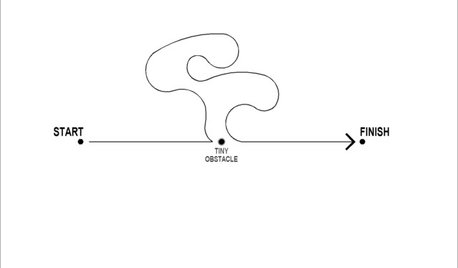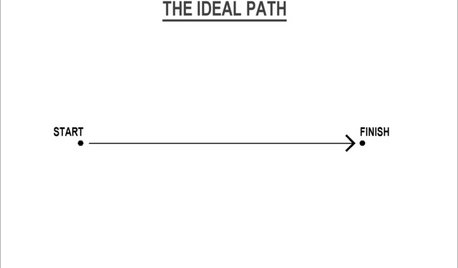so many books
diggingthedirt
19 years ago
Related Stories

TILESo Many Reasons to Love Cement Tiles
You’ll notice their beautiful patterns right away, but cement tiles have less obvious advantages too
Full Story
COFFEE WITH AN ARCHITECTThe Many Paths of Design, Part 2
Just when you thought the plans were on track ...
Full Story
ARCHITECTURERoots of Style: Many Cultures Make Their Marks on Mediterranean Design
If you live in California, Florida or certain other parts of the U.S., your architecture may show distinct cultural influences
Full Story
MOST POPULARThe Many Paths of Design, Part 1
Blame engineering issues, unforeseen revisions or even the Internet. As these diagrams show, it's probably not your fault
Full Story
HOUZZ TOURSMy Houzz: Many Styles Meld Handsomely in a Vermont Countryside Home
With a traditional exterior, a contemporary interior and lots of Asian furniture, this home goes for the element of surprise
Full Story
HOUZZ TOURSHouzz Tour: 10 Acres, 3 Generations and Many Animals in North Carolina
Check out a throwback-style cabin that celebrates simplicity, reclaimed materials and family
Full Story
FIREPLACESObjects of Desire: Modern Fireplaces Play Many Roles
Space definers, warmth bringers, soul stirrers ... these modern fireplaces earn their keep for more than their good looks
Full Story
ARCHITECTURECity View: Atlanta's Design Style Warms to Many Tastes
Outdoor living and hospitality? Of course. But Atlanta's architecture and interior designs express much more than just traditional notions
Full Story
DECORATING GUIDESSo Your Style Is: Black, White and Read All Over
Make headlines at home with newsworthy decor
Full Story
FUN HOUZZSo Your Style Is: Sci-Fi Past and Future
Are you more likely to search for design ideas at Comic-Con than High Point Market? If so, the future of decorating is yours
Full StorySponsored






veronicastrum
poppa
Related Professionals
Brentwood Landscape Architects & Landscape Designers · Bloomington Landscape Contractors · Haverhill Landscape Contractors · Kaneohe Landscape Contractors · Lakewood Landscape Contractors · Canby Fence Contractors · Centereach Fence Contractors · Corona Fence Contractors · Downers Grove Fence Contractors · Fountain Hills Fence Contractors · Hayward Fence Contractors · Lincolnwood Fence Contractors · Modesto Fence Contractors · Woodland Fence Contractors · Rolling Meadows Stone, Pavers & Concreteinkognito
pinetree30
inkognito
jonathan_e